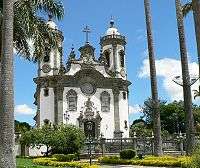São João del Rei

São João del Rei, also spelled São João del Rey or São João del-Rei, is a Brazilian municipality in the state of Minas Gerais. It is a historical city with much 18th-century architecture. The current population is estimated at 85,000 inhabitants.
Location
It is located in the drainage basin of the Rio Grande and its terrain is located in the Mantiqueira mountains. It is a centre for the cities in the south and southeast of Minas Gerais.
The municipality contains part of the Ritápolis National Forest.[1]
History
The city was founded by the bandeirantes; Tomé Portes del-Rei is considered the city's founder. The original small village situated in southern Minas Gerais was created as a staging post on the Estrada Real, a trade route from the coast at Paraty to cities in the central region of Minas Gerais such as Ouro Preto, Mariana and Conselheiro Lafaiete. Later huge amounts of gold were found near the city itself.
Culture
Today, São João del-Rei is a university town. The campus of the Federal University of São João del-Rei (UFSJ) and a number of other educational institutions are present in the city. A second medical school is to be established at the University.
The city has many famous religious festivals through the year, most of them preserving the way it was celebrated by the time of the foundation, with baroque music and special celebrations that attracts tourists from all over the world, particularly during Holy Week, when the town receives the greatest influx of visitors.
Cathedrals and churches
- Catedral Basílica do Pilar (1721), seat of the Roman Catholic Diocese of São João del Rei
- Rosário (1720)
- Carmo (1733)
- Mercês e Bonfim (1769)
- São Francisco de Assis (1774)
- Senhor dos Montes Santo Antônio
- N. Sra. da Piedade do Bom Despacho
Famous people from São João del Rey
São João del-Rei is the birthplace of some distinguished people, amongst whom are President Tancredo Neves, Cardinal Lucas Moreira Neves, Otto Lara Resende, José Maria Xavier, and Francisca Paula de Jesus.
- Tiradentes (Brazilian national hero)
- Tancredo Neves (former Brazilian president)
- Lucas Moreira Neves (Brazilian cardinal)
- Bárbara Heliodora
- Otto Lara Resende
Estrada de Ferro Oeste de Minas
São João del Rei was an important station on the Estrada de Ferro Oeste de Minas, a narrow gauge railway characterised by woodburning steam locomotives, and the location of a major roundhouse. The station and surrounding facilities have been turned into Brazil's largest railway museum, and a tourist railway operates from the station to the well preserved colonial town of Tiradentes.
References
- ↑ Unidade de Conservação: Floresta Nacional de Ritápolis (in Portuguese), MMA: Ministério do Meio Ambiente, retrieved 2016-05-19
External links
| Wikivoyage has a travel guide for São João del Rei. |
- (Portuguese) Guia Turistico e Histórico de São João Del Rei
- (Portuguese) Municipal website
- Guia del Rei
Coordinates: 21°08′09″S 44°15′43″W / 21.13583°S 44.26194°W
